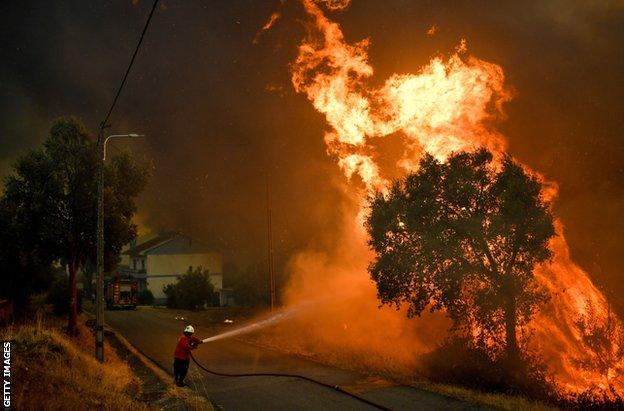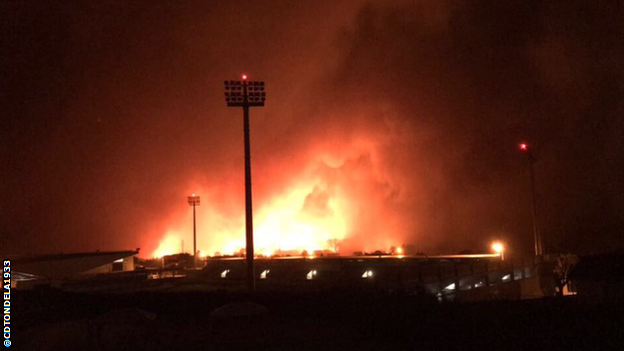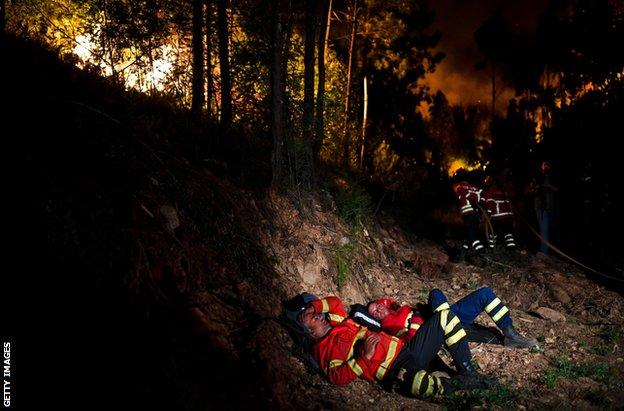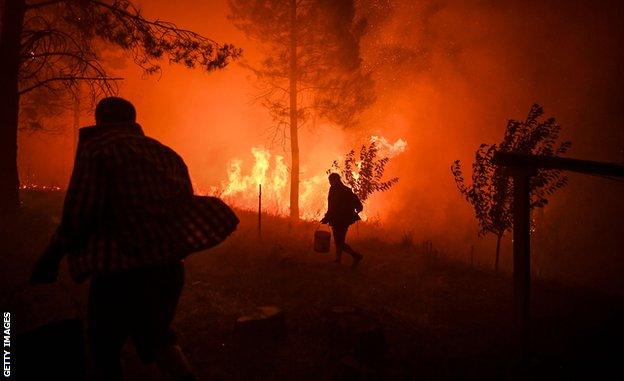Wildfires: How Portuguese club Tondela drove through the flames
- Published


Portugal's 'wildfire season' has in recent years effectively extended from two to five months
When Joao Redondo took his usual place on Tondela's team bus, all he wanted was to forget the defeat that had knocked his side out of the Portuguese Cup in the third round.
Sitting at the front of the coach, right next to the driver, the general manager had plenty of time to reflect on that afternoon's 3-2 loss at Leixoes. They were stuck in traffic. This wasn't all that unusual, but something just didn't seem right.
Eventually, the bus managed to escape the congestion when entering the A25 motorway. The journey back to Tondela, in central Portugal, from Leixoes' ground in Matosinhos, near Porto in the north-west, was only about 150km. In theory it was an easy trip. They had no idea of what was coming.
The team had gone through the rural village of Vouzela and were only 40km from home when all of a sudden, after making a turn, they found themselves surrounded by a wildfire. It was a scene of complete pandemonium; parts of flaming trees flew through the air with a noise that sounded like the roaring sea.
Redondo couldn't believe his eyes. He told the driver Luis Chaves to stop immediately. Chaves, however, didn't listen to him. The bus was too big to quickly turn around, he thought - it was too dangerous. He kept saying: "I have to go through it, I have to go through it."
And so, on 15 October 2017, the Tondela team leapt into the unknown, driving on, literally through the fire.
"The flames were coming from everywhere, from all sides," recalls then Tondela goalkeeping coach Joao Ricardo.
"Some of us wanted to go ahead, others didn't. It was obviously a risk, but if our bus had stopped it would have been a risk too. We could have caused an accident or been caught by the fire.
"As we drove through, you could feel the heat inside the bus. It was an unbelievable sensation."
Other members of the Tondela staff, returning separately from the game, reached the same point minutes later. By that time the fire had totally engulfed the road and they couldn't get through. They were forced to turn and flee, driving back the wrong way along one of Portugal's busiest highways.
"If you ask me if I felt scared, I actually didn't at the time because we weren't fully aware of the danger, the risks of the situation," adds Redondo.
"But we could have died there."

The fires spread close to Tondela's stadium and training complex
Defender Ricardo Costa would speak later of the "burning pieces of tree" that continued to hit the team bus on its journey back to Tondela, population 29,000. As they approached the city, the picture was calmer. It seemed the worst was over.
Manager Pepa and his coaching team decided to go for something to eat, on the outskirts of town. They didn't think the fire would catch them again. But it did.
"We had been in the restaurant for a while when we heard a strange noise coming from the surrounding hills," Ricardo says.
"Soon we realised it was the blaze coming in our direction. It was absolutely terrifying.
"We headed to the centre of Tondela and found chaos there - gas cylinders exploding, cars rushing to escape. I had never seen anything like it.
"This is a place where you usually don't have anyone in the streets after 7pm. That day, it was already past 10 and the traffic was incredible, everybody was desperate to flee."
In the confusion, the coaching team ended up getting separated - and there was no phone reception. Pepa and assistant Pedro Oliveira remained together.
"We stayed at Pepa's house - we were safe there, it was in front of a fire station," says Oliveira.
"But at some point Pepa said: 'We're all young and healthy, what are we doing? We need to go out and help.' And so we went, with wet clothes over our noses and mouths because there was a lot of smoke outside.
"It was around 4am when we returned. Among other things, we took an elderly man who was in a critical condition to hospital."
Midfielder Helder Tavares was also out in the streets as the flames raged. He was with neighbours, helping connect to a fire hydrant so they could douse a nearby factory they feared might explode. Later, he went to check on goalkeeper Claudio Ramos, who lived nearby. They considered trying to drive to safety but found they couldn't leave.
Meanwhile, veteran defender Costa was sheltering in the depths of his hotel.
"There were waves of fire, flames above the fire. It was chaos," he told the Record newspaper.
"The hotel was full of smoke and the alarms were going off. We had to flee to the basement with wet towels covering our faces. That was plan B. Plan C was to run into the pool.
"Everything was burning all around, we had no chance of escape."
Overall, 51 people lost their lives across the region that day, many of them trapped in vehicles as they tried to escape the flames. It was only the second deadliest wildfire in Portugal that year. A few months earlier, in June, a blaze close to the town of Pedrogao Grande had killed 66.

Firefighters rest during the wildfires of central Portugal in June 2017
While forest fires are part of life in Portugal - indeed, they can play an important role in nature by helping control insect and disease damage - what happened in 2017 was unprecedented. Around 5,000 km² of land was destroyed, an area more than three times the size of London.
It was the largest burned area ever recorded in Portugal, the worst such disaster in the country's modern history with an economic toll estimated at 1bn euros.
And climate change is making things worse.
Climate change increases the risk of the hot, dry weather that fuels wildfires. The world has already warmed by about 1.2C since the industrial era began and temperatures will keep rising unless governments around the world make steep cuts to emissions.
On Monday, as wildfires continued to devastate parts of Greece and California, a key report from the Intergovernmental Panel on Climate Change spoke of a "code red" for humanity. It warns of increasingly extreme heatwaves, droughts and flooding, and a key temperature limit being broken in just over a decade.
The European Environment Agency predicts an expansion of fire-prone areas and longer fire seasons across most of the continent, including its more northern regions, although Portugal, Spain and Turkey will remain the countries with "highest absolute fire danger".
In Portugal's case, the 'wildfire season' has in recent years effectively extended from two to five months.

Villagers carry buckets with water to try and extinguish a fire close to their homes in Macao, south of Tondela, July 2019
Facing the Atlantic on Europe's south-west edge, Portugal is a warm country fanned by strong winds off the ocean. Geography is one thing, but many believe the authorities share a part of the blame.
The response to the fires of 2017 was widely criticised, particularly the lack of a warning system and the insufficient number of professionals available to tackle the blazes. The vast majority of firefighters in the country are volunteers.
The deaths brought Prime Minister Antonio Costa's administration under heavy scrutiny and led to the resignations of the Interior Minister and the head of the National Civil Protection Authority.
The government has since vowed to improve its forestry management.

"The Devil was on the loose," read the front cover of the Jornal de Noticias on the morning of 16 October 2017.
Many homes in Tondela and the surrounding countryside were destroyed. The flames reached the club's training complex - but it escaped damage.
Still, the poor air quality meant they had to spend the next week training inside.
"We all had to use these masks that are now common because of the pandemic," Redondo says. "The quality of the air was horrible and I had to go for treatment. My throat was clogged."
It was only natural, under those circumstances, that Tondela asked for the postponement of their next home match, scheduled for the following Sunday - 22 October. When they did, their opponents Belenenses SAD refused to accept.
Tondela reacted by immediately cutting ties with the Lisbon club. They prepared for the weekend as best they could. And then, on the pitch, while fans sang for the firefighters, they secured a 2-0 triumph. There were tears on the field and in the stands.
Despite having one of the league's lowest budgets, Tondela have upset the odds to avoid relegation in the past six seasons. They remain the only significant football power from Portugal's central territories - an underrepresented and neglected region of the country compared with the areas around Porto and Lisbon.
At the end of that 2017-18 season, they achieved their best-ever top-flight finish, with 11th place. It was a genuine moment of joy for a people who had suffered such trauma months before.
"It may sound like a cliché, but this story is about much more than football. It's about people who deserve much more in life," Oliveira adds.
The bond between club and fans was at its strongest during the night of October 2017 when nobody slept.
With a new season under way, and memories of the wildfires still fresh, in Tondela they're just praying for a quiet summer.

Parents We've Got You!: Six challenges across six weeks to keep your child or teenager busy this summer
Real or Cake?: Can you guess which of these are the real items and which are sugary fakes?
